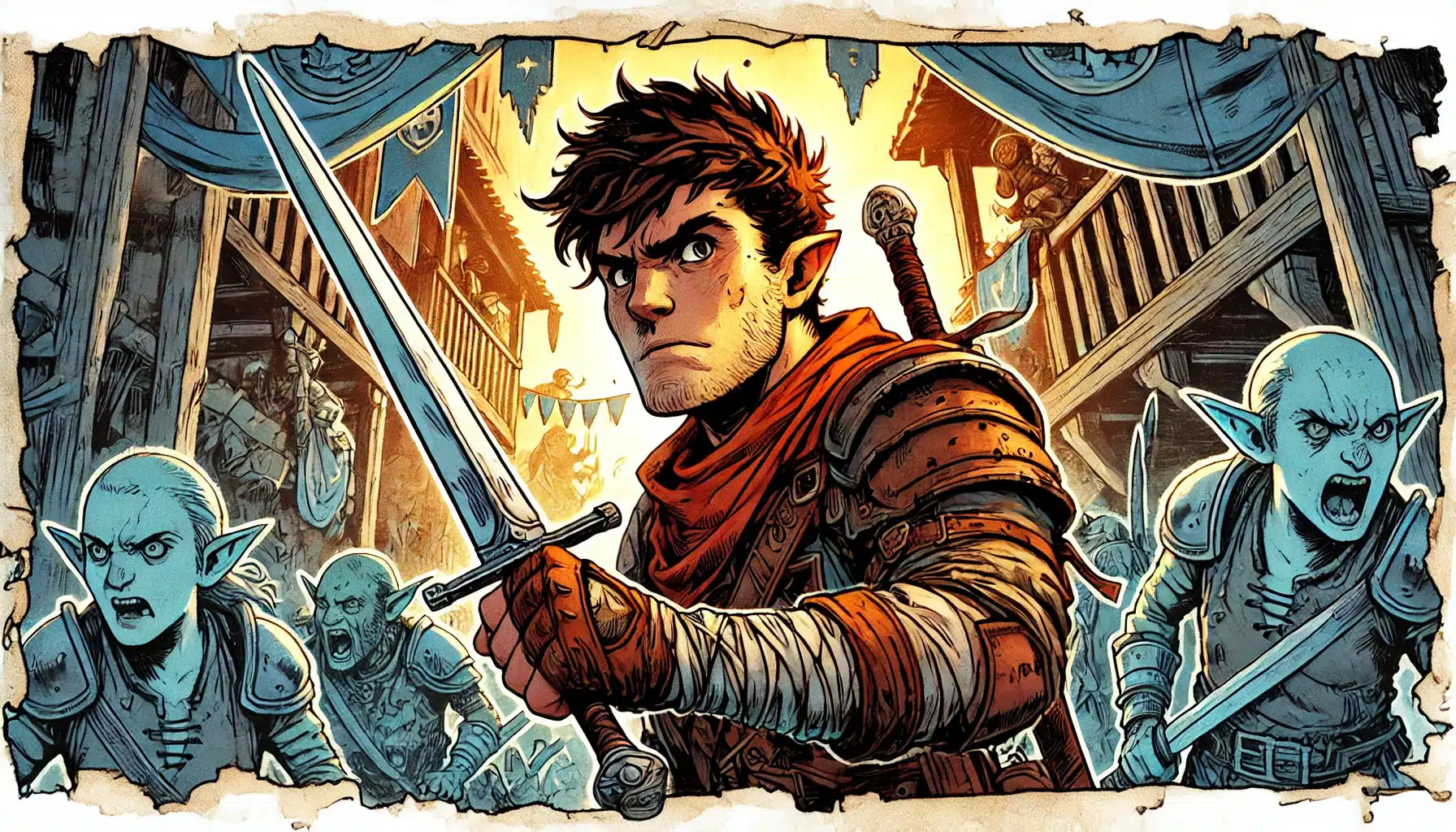Imagine entering a world where dragons soar above and magic is as real as the air you breathe—welcome to Dungeons & Dragons (D&D), a realm of endless adventures. But here’s the thing: while this imaginative game boasts a vast array of rules and mechanics, it’s the social dynamics between the players and the Dungeon Master (DM) that truly bring a session to life. You might think that rolling dice and crafting spells are all you need, but there’s more to making these nights unforgettable.
In the heart of any great game lies a social contract, an understanding among players that keeps the ambiance just right. Metaphorically speaking, it’s akin to the invisible threads connecting a spider’s web—fragile yet crucial for holding the entire structure together. These unwritten rules of table etiquette ensure fairness, maintain immersion, and most importantly, maximize the fun for everyone involved. Imagine a party without them—chaos, confusion, and maybe a bit of comedy at best.
Now, why does this matter, you ask? Well, without adhering to some basic etiquette, even the best-crafted campaign can spiral into disaster. Picture a DM setting the scene of an epic battle while players are off in dreamland, more focused on what’s cooking in the kitchen than the dragon breathing fire in front of them. Or consider rules disputes that turn from polite suggestions into heated debates—hardly the makings of a grand adventure.
Therefore, understanding the subtle nuances of game etiquette is just as important as knowing your spell slots or your character’s backstory. It’s what keeps everyone on the same, harmonious page. After all, a session of D&D is less about winning and more about collective storytelling. A good game resonates with the laughter, gasps, and anticipation that only arise when everyone’s in it together. Respecting the table’s dynamics and being open to improvisation allows for a richer, more immersive experience. This is especially true when incorporating homebrew rules in D&D, as they can add unique twists that enhance the story while requiring players to remain flexible and considerate. When everyone values both the rules and the spirit of collaboration, the adventure becomes more than just a game—it becomes a shared legend.
Beyond just being polite, adhering to table etiquette means ensuring that everyone—DM included—has an equal opportunity to shine. It establishes an environment where each player knows their voice will be heard, their ideas valued, and their character respected. Otherwise, we run the risk of alienating those who might become lifelong fans of tabletop gaming.
Of course, these guidelines are not meant to stifle creativity or spontaneity. Quite the opposite! They’re like the gentle breeze guiding your ship across uncharted waters, adding structure without confinement. By understanding these unspoken rules, you develop an instinctive sense of when to speak, when to listen, and most important of all, when to roll the dice in silence.
Try my AI Tabletop RPG generators...and an extensive library of content!
Consider these rules as your toolkit for building a cohesive, exciting, fantasy-driven night of D&D. They’re not just for newcomers; even seasoned veterans can benefit from a refresher. So whether you’re a veteran with tales of glory or a newbie about to roll your first 20-sided die, let’s dive into these essential bits of wisdom to ensure your game nights are as epic as the legends themselves.
- D&D Rule 1: Show Up Prepared and On Time
- D&D Rule 2: Stay Engaged – The Game Needs Your Attention
- D&D Rule 3: Respect the DM’s Decisions (Even If You Disagree)
- D&D Rule 4: Be a Team Player – Don’t Hog the Spotlight
- D&D Rule 5: Roleplay Respectfully – Stay in Character, But Don’t Be a Jerk
- D&D Rule 6: Meta-Gaming Can Kill Immersion – Keep Player and Character Knowledge Separate
- D&D Rule 7: Know When to Be Serious and When to Joke Around
- D&D Rule 8: Respect Boundaries – D&D Should Be Fun for Everyone
- Final Thoughts on D&D Etiquette
D&D Rule 1: Show Up Prepared and On Time
We’ve all been there—a Saturday night, snack bowls at the ready, and all eyes on the clock. For D&D players, the clock isn’t just a timekeeper; it’s a silent yet vital member of your adventure party. Being prepared and punctual is the cornerstone of showing respect to your fellow players and maintaining the momentum of the game.
Imagine this: the DM is setting the scene for a grand battle with towering beasts, and half the party is still trying to find which pocket their dice disappeared into. Frustrating, isn’t it? Unprepared players can slow down the game’s pace and derail the carefully crafted tension that the DM has spent long hours to build. When players come late, it’s like inviting the final boss to high tea and showing up fashionably—but annoyingly—late.
So, how do you dodge the embarrassment of unpreparedness? Here’s a handy list to ensure you’re ready when the dice start rolling:
- Read and understand your character sheet before the session starts.
- Bring all necessary items—dice, character sheet, props, snacks—the essentials.
- Familiarize yourself with the current storyline and remember where your character left off.
- Know the rules relevant to your character class.
- Refill your water bottle before the game starts to minimize interruptions.
- Communicate with your fellow players and DM if you’re running late.
- Keep a notebook for session notes to help track plot points and NPCs.
- Settle into your spot a few minutes early, so you’re ready to go at the agreed time.
- Ensure your miniature (if you use one) is accounted for and at the ready.
- Plan character moves ahead of your turn to keep the action swift.
- Charge your devices beforehand if you use digital aids.
- Prepare your role-playing mindset and intentions for your character’s development.
When you’re prepared, you’re respecting everyone’s time. And respecting time may not seem like a big deal, but in a group setting, it’s the glue that holds everything together. Being ready streamlines the experience—less stumbling over numbers means more time for epic storytelling and heroic deeds. Not only does your group appreciate your effort, but the sheer satisfaction of diving right into a smooth-running session is a reward in itself.
⚔️ Fantasy RPG Random Tables Books
Make life as a Gamemaster easier…
If you play Dungeons & Dragons, Pathfinder, or other fantasy RPGs, this
RPG random tables series
is packed with encounters, NPCs, treasure, and more. Available in eBook or print—either way, you’ll have a wealth of adventure ideas at your fingertips.
Ultimately, when players show up prepared and on time, they’re not just being courteous; they’re being invested storytellers, co-creating a memorable experience. Ready players create better teamwork, ensuring no scene drags longer than it should while maintaining the anticipation and excitement that makes D&D what it is—a cooperative narrative where every roll can redefine the saga.
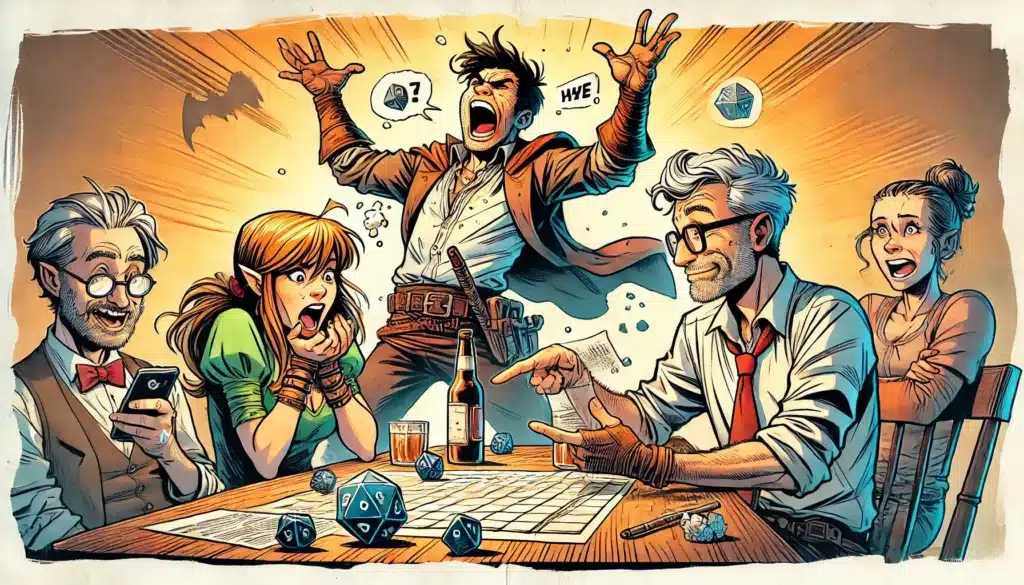
D&D Rule 2: Stay Engaged – The Game Needs Your Attention
In a world bursting with distractions, staying focused on a D&D session can feel like trying to meditate at a rock concert. Still, giving the game your undivided attention is crucial. Picture this: you’re about to slay an orc, everyone’s waiting on your spell, and suddenly, you’re miles away, lost in a text thread about cat memes. Meanwhile, the tension flatlines faster than a rogue rolling a one on stealth.
Paying attention does more than keep you from missing key plot points or battle details; it fuels the narrative engine. Each player’s focus feeds into a collective experience, creating magic that can turn the ordinary into the extraordinary. A distracted player sows seeds of shared confusion, dragging scenes like a frayed sweater caught on the door handle.
Here’s a little table to help illustrate some common distractions and how to banish them:
| Common Distraction | Why It’s Disruptive | How to Avoid It |
|---|---|---|
| Checking phone constantly | Misses important plot points | Silence notifications before the session |
| Side conversations | Breaks immersion | Discuss between scenes or during breaks |
| Web browsing | Misses in-game action | Close browsers unless for game use |
| Eating loudly | Distracts others | Nosh quietly or during breaks |
| Overplanning next move | Miss out on current scene | Stay engaged with ongoing play |
| Zoning out | Misses direct cues | Take notes to stay grounded |
| Distracting costumes | Breaks character immersion | Save elaborate wardrobe changes for LARP |
| Sharing unrelated memes | Derails focus | Share funny content outside of game time |
| Drinking excessively | Impairs focus | Keep it light if alcohol is involved |
| Multi-tasking with other work | Divides attention | Dedicate game time solely to D&D |
By staying engaged, you lift the game above basic interaction into true collaborative storytelling. The DM relies on your presence, both mental and physical, to push the narrative forward. It turns each scene into an act of co-creation rather than a mere recital by the DM. When everyone’s eyes are on the table, magic happens—conversations flow, battles become gripping, and laughs are genuine and shared.
A seamless session depends on collective investment and attention. Even without thousands of pounds of actual gold, the memories you forge during these adventures will be treasures all on their own, and those don’t tarnish like forgotten artifacts. Next time your mind starts to wander, remember that your spotlight moment could come next, and without the right focus, you might just roll right past it.
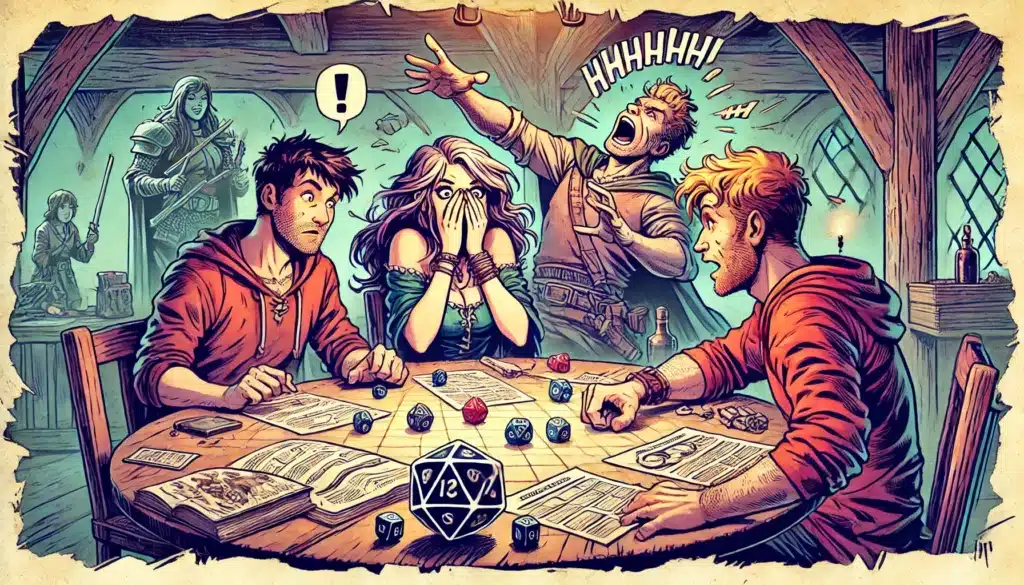
D&D Rule 3: Respect the DM’s Decisions (Even If You Disagree)
Ah, the eternal struggle between the player and the Dungeon Master—an intricate dance akin to cat vs. mouse, but with more dragons and less fur. Rule of thumb: respect the DM’s decisions. It keeps the game running smoother than a well-oiled gelatinous cube. It might feel unfair when your character suddenly trips into a pit of despair, but mid-game rule disputes are like tossing rocks into a calm pond—you get ripples, distractions, and wet socks.
The DM isn’t an all-seeing oracle, but they’ve got the rulebook in one hand and the fate of your character’s day in the other. A debate over decisions during play stifles the story’s flow, derailing everyone else’s experience. So, how does a respectful yet occasionally rebellious player handle disagreements? Well, like a player crafting an intricate spell, it’s about timing and nuance.
Here are some respectful ways to handle those times you’re tempted to cry foul:
- Jot down your disagreements for a post-session discussion.
- Trust the DM’s judgment; they’re referees and co-storytellers rolled into one.
- Acknowledge the “rule of cool” because sometimes creative storytelling outweighs bookish precision.
- Appreciate that DMs can’t remember every rule; a slip-up is human, not world-devouring.
- Offer constructive suggestions after the session, suggesting alternative interpretations.
- Rely on fellow players as mediators for a balanced view.
- Recognize when to keep the debate offline and track main points for resolution later.
- Advocate for consistency over perfection; the same ruling should be reliable.
- Concede during disputes; relenting keeps the atmosphere amicable.
- Appreciate your DM’s perspective—they’re juggling more than you realize.
- Focus discussions post-game, keeping the current session’s rhythm intact.
Trusting the DM is essential. They’ve spent countless hours crafting adventures that go beyond the pages, welcoming each player into realms they’ve conjured from boundless imagination. By opening that space up for later discussion, you not only ensure your concerns are heard, but you also minimize distractions. Plus, it gives everyone a chance to evaluate all angles with cooler heads.
Believing in a DM’s call isn’t about blind faith. It’s about acknowledging effort, recognizing intent, and knowing they’re driven by more than just the whims of dice. Accepting decisions—as wild as they might seem when taken with good spirit—enriches the game. After all, it’s a shared exploration. The only role-playing you should worry about is the one with a sword, not your axes to grind. Respect keeps the magical tapestry spinning so everyone can keep enjoying the ride.
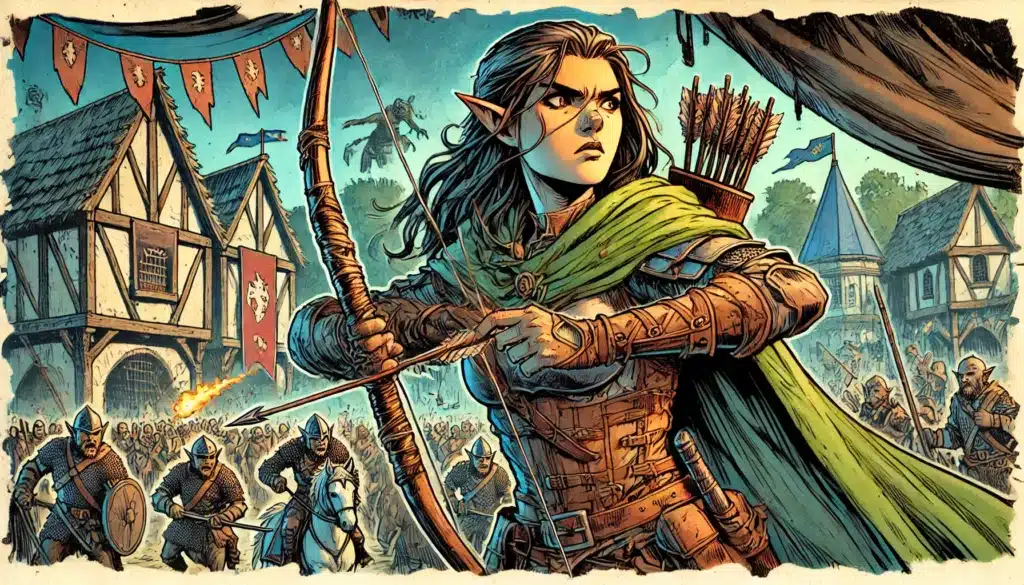
D&D Rule 4: Be a Team Player – Don’t Hog the Spotlight
Every party has a bard, someone who claims the spotlight and turns the adventure into their own personal musical. But here’s the thing: D&D is a shared experience—a grand narrative where everyone gets their moment. No one enjoys a game where one player shines while others are left to dawdle in the shadows, crafting nonexistent limericks.
Imagine being a quiet player waiting for the perfect moment to unveil your character’s backstory, only to have it hijacked by the perpetual spotlight-hogger. Sharing the narrative and ensuring everyone has a turn in the limelight builds camaraderie and makes the adventure richer for all involved. So, how does a responsible player balance their star moments without overshadowing those of their comrades?
⚔️ Fantasy RPG Random Tables Books
Make life as a Gamemaster easier…
If you play Dungeons & Dragons, Pathfinder, or other fantasy RPGs, this
RPG random tables series
is packed with encounters, NPCs, treasure, and more. Available in eBook or print—either way, you’ll have a wealth of adventure ideas at your fingertips.
Let’s take a look at some common spotlight-hogging behaviors and how to curb them:
| Hogging Behavior | Problematic Because | Better Alternative |
|---|---|---|
| Always taking the final blow | Other players feel left out | Encourage others to have big moments too |
| Solving every puzzle | Limits others’ chance to shine | Let others lead in their areas of expertise |
| Interrupting roleplay | Detracts from other players’ moments | Wait for pauses to add input |
| Constantly strategizing | Dominates tactical discussions | Encourage quieter players to share ideas first |
| Playing center of drama | Overpowers others’ roleplay opportunities | Share personal arcs collaboratively |
| Always correcting others | Discourages learning through mistake | Offer guidance only when requested |
| Steering story decisions | Dictates player agency | Ask what others think before major choices |
| Needing constant DM attention | Slows game pace | Check in with DM privately if necessary |
| Taking too many actions | Disrupts turn balance | Recount actions to allow space for others |
| Solo scenes of distraction | Favors individual over collective fun | Integrate individual scenes into broader narrative |
Inspiring a team dynamic requires generosity on every player’s part, ensuring that each member might learn, lead, and grow. Whether you’re a seasoned wizard with spells galore or a novice rogue fumbling through your new talents, everyone deserves a shot at glory. Share your platform and dish out collective triumphs because nothing strengthens party dynamics like joint victories and lessons learned.
When you play as a team player, not only are campaigns more engaging, but they also forge stronger friendships off the table. The fellow dragons-vanquishers and dungeon-looters become your allies beyond the imaginary realms—they become real friends in matching T-shirts and shared stories of the one time you didn’t let the bard hog the spotlight. Spread the heroics around, and you’ll see how quickly those party bonds grow indestructible.
D&D Rule 5: Roleplay Respectfully – Stay in Character, But Don’t Be a Jerk
Roleplaying in Dungeons & Dragons is like trying on an entirely new personality, flaws, and all. It’s a chance to be the rogue with a quick wit or the paladin burning with righteousness. But here’s the twist: roleplaying is not a get-out-of-jail-free card for bad behavior. Sure, your character might be a tad grumpy or have a penchant for chaos, but you still need to keep other players’ enjoyment in mind.
Imagine this: you’re deep in character, living that mischievous bard life, but suddenly, you’re throwing everyone else’s plans into a wizard’s fire pit because “that’s what your character would do.” No one appreciates unwarranted disruption mistaken for character depth. Good roleplay shouldn’t derail the mission; it should enhance the shared story, making it richer—not just louder.
To maintain harmony while staying true to character, consider these etiquette tips:
- Respect others’ boundaries—if someone isn’t comfortable, adjust your roleplay.
- Keep excessive interruptions to a minimum; let others have their turn.
- Avoid using “it’s what my character would do” to justify unkind or disruptive actions.
- Listen actively during other players’ roleplaying moments.
- Play your character realistically—characters can have flaws without being jerks.
- Keep personal and character knowledge separate; don’t use foresight unfairly.
- Always involve other players by engaging with their characters.
- Evolve your character logically based on past narrative events.
- Avoid physical contact or humor that might make others uncomfortable.
- Acknowledge how your actions affect group dynamics and adjust accordingly.
- Respect fellow players’ creative inputs—they add new dimensions to unfolding plots.
- Strive for empathy, ensuring no one leaves the session feeling excluded or disrespected.
When executed well, roleplaying isn’t just acting—it’s a balancing act that merges charisma with consideration. That dynamic of give-and-take fosters a healthier and richer gaming environment. If everyone agrees that actions even slightly beyond the line of comfort will be put aside, then the possibilities for character interaction open wide like mythical portals to adventure.
The beauty of roleplay lies in its potential to inspire, imbue meaning, and craft unforgettable stories. But remember, each tale is co-authored, and the best stories invariably spawn from respect and collaboration. Harness the power of roleplay responsibly, and you’ll find sessions brimming with layered personalities, dynamic encounters, and, most importantly—a shared journey everyone wants to embark upon next time.
D&D Rule 6: Meta-Gaming Can Kill Immersion – Keep Player and Character Knowledge Separate
Here’s a paradox: the more you know, the less your character should. Meta-gaming in Dungeons & Dragons is the dark arts of blending player knowledge with character actions. While it might seem advantageous to telepathically convey wisdom you acquired outside the narrative, it saps the game of its authenticity and surprise. No one wants to watch the magician explain their tricks instead of striving for awe.
Try my AI Tabletop RPG generators...and an extensive library of content!
Imagine your character is blissfully unaware there’s a goblin ambush around the bend, yet you’ve seen the map. Acting on this out-of-character knowledge? It’s like reading spoilers: frustrating and unfulfilling. Instead, bask in suspense; that ignorance is gilding your character’s genuine experience of discovery.
Here’s a table with typical meta-gaming examples, why they’re issues, and how to handle them:
| Meta-Gaming Example | Why It’s an Issue | Alternative Approach |
|---|---|---|
| Planning with out-of-character info | Undermines suspense and fairness | Act on info your character would know |
| Using player knowledge of monsters | Diminishes in-game strategy | Roll knowledge checks or discover naturally |
| Sharing inside jokes mid-scene | Breaks immersion | Save jokes for between or after sessions |
| Switching tactics unprompted | Seems forced and unrealistic | Stick to your character’s instincts |
| Navigating challenges with pre-session info | Spoils puzzle-solving fun | Role-play discovery and adaptation |
| Treating magic items based on names | Reduces wonder of discovery | Experiment in-character to learn effects |
| Identifying NPC motivations unfairly | Cheapens storyline development | Let interactions guide your understanding |
| Solving puzzles using player leaps | Bypasses character contributions | Use in-character logic and collaboration |
| Avoiding known threats despite ignorance | Lacks plausible explanation | Allow natural experiences to guide actions |
| Leading scenes using DM updates | Creates unreal advantages | Wait for narrative cues before proceeding |
Maintaining a clear division between you and your character secures the authenticity and challenges driving D&D. The less tangled this line is, the better the adventure feels. Imagine discovering a dungeon’s secrets as the story unfolds, not as your knowledge expects it to. It’s the thrill of new horizons, of confronting barriers together, not knowing if beyond the cliff lies treasure or yet another dragon (probably both).
When players elegantly manage themselves—compartmentalizing what their characters genuinely know—the stakes intensify. Characters blaze trails steeped in innovation and intuition leaping from dice rolls, not spreadsheets. Every encounter feels genuine and accelerates the sense of accomplishment.
Good metagaming is letting your character bumble splendidly into each moment with honest curiosity. The best rewards lie in plunging through these foggy moments together, unearthing challenges as they come, and letting magic unfurl around you through mystery and mastery alike.
D&D Rule 7: Know When to Be Serious and When to Joke Around
Humor is an essential spice in any great D&D recipe. But like too much chili, it can set things ablaze—sometimes in the best ways, and other times in ways that make you wish you’d stuck to the mild salsa. Sure, landing a perfect one-liner right before a dragon bucks fire is chef’s-kiss territory. But constant joking can pull everyone out of the atmosphere faster than a rogue smudging their first sneak attack.
Let’s face it—funny moments can make a session legendary, but they can also derail tension and tone if not carefully placed. Finding that sweet spot between laughter and immersion can elevate a campaign from mundane to magical. Staying attuned to when humor enhances instead of disconnects the group is your key to comedic balance.
Here are some strategies for mastering the humor-blend:
- Read the room’s mood before injecting humor—understating and sync helps.
- Mirror the DM—serious tones? Match them. Light-hearted sessions? Let the laughter flow.
- Keep humor relevant to the storyline or characters.
- Abstain from jokes if the scene is tense or climactic; reserve for lighter moments.
- Recognize when to rein it in, especially if the story’s momentum suffers.
- Encourage others to join in; jokes should be inclusive for broader laughs.
- Respect plot builds; hold back premature punchlines until a scene breathes.
- Use call-backs wisely; too much repetition can break rather than build camaraderie.
- Deliver wit with character flair; awkward or themed can blend fiction smoothly.
- Know when to pause for a serious turn; balance brings out the best in RP moments.
Good humor is all about timing and delivery. It curates camaraderie, lifting the spirits, painting characters as three-dimensional spectacles, and often tying an absurd bow on impending doom. Let laughter evolve naturally through character interactions instead of haphazard punchlines. This way, you won’t crowd everyone’s dramatic space or short-circuit looming tension with misplaced gags.
Yet, remember—while your halfling rogue’s chuckles come easy, a serious adventurer’s tale thrives when carried steady with conviction. Fighting for kingdoms, conquering storms, and tackling inner shadows add depth as laughter punctuates the adventure. Like any fine symphony, when mixed in proper proportions, laughter underscores the sweeping epic, leaving every note resonating long after the session end.
The sweet spot? Respectfully reading group dynamics between sincere and silly ensures everyone has their fill of fun and gravitas. Laughter should be the dessert—delicious but not a main course. Share the chuckles so they enhance each moment, binding them into cohesive and rounded sessions that echo long into your gaming future.
D&D Rule 8: Respect Boundaries – D&D Should Be Fun for Everyone
D&D offers a boundless world of creativity, but the spaces we explore need to remain safe and enjoyable. Even in fantasy settings, real-world sensitivities follow like shadows. While it can be thrilling to tackle deep themes, it’s vital that no player feels backed into an awkward corner. A hero’s journey thrives on mutual respect; after all, no one signs up for an adventure to find their morale swept aside like unwanted loot.
Dungeons & Dragons might tread upon serious concepts, blurring lines between reality and unreality. Battles can soar to dramatic heights, past life’s unavoidable challenges. Using session zero to hash out storylines or raising safety cards guarantees comfort zones only get touched upon with consent—not trampled by surprise detours.
Let’s reflect on handling sensitive scenarios:
| Potentially Sensitive Topics | Why They’re Sensitive | Addressing Through Sessions |
|---|---|---|
| Extreme violence | Can trigger discomfort | Employ X-cards for immediate feedback |
| Real-world trauma | Engenders unease | Discuss limits during session zero |
| Horror | Might disturb thresholds | Offer alternatives or toned-down versions |
| Intense character death | Emotional distress potential | Prep players then execute with care |
| Specific phobias | Need consideration | Extending opt-out options is courteous |
| Political analogies | Could create tension | Avoid mixing personal stands without group consent |
| Religious themes | May conflict with beliefs | Keep representations unbiased or confirm comfort levels |
| Graphic descriptions | Risk crossing lines | Tailor descriptions to group’s comfort |
| Social themes | Evokes opposing views | Encourage open dialogue about sensitivities |
| Mature content | Should be consensual | Ensure all are comfortable or skip entirely |
D&D must contain inclusivity without compromising dignity. Ensure every player feels seen, heard, and known—their preferences weaving seamlessly into gameplay for an ephemeral masterpiece once measured in paper-castles. This way, immersive plots do not tiptoe through thorny, unintended terrains, but stride safely across magnificent shores.
It takes conscious communication to realize rich narratives minus unpleasant surprises—ones avoiding emotional camouflage. By practicing sensitivity, storylines channel into enlightenment rather than confrontation—where players align freely, creating authentic bonds binding adventures slowly crafted into their shared legacies.
Fantasy grounds like these become uplifting tales everyone desires to return to. As you charge boldly where no adventuring party has ventured before, maintaining respect invites all into the story untarnished—the canvas as it was meant to be: transformative, healing, and inclusive.
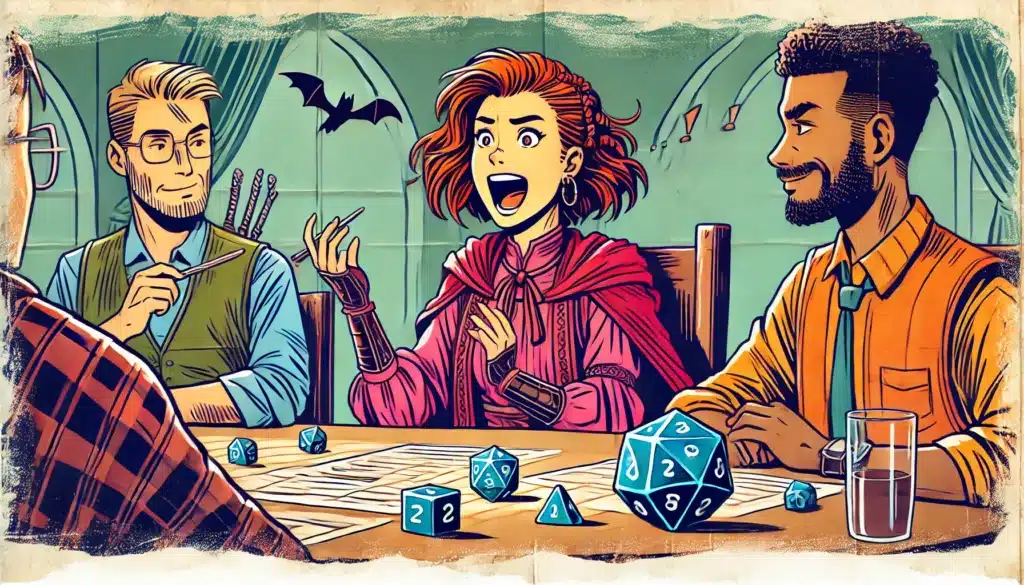
Final Thoughts on D&D Etiquette
In the whimsical, wondrous world of Dungeons & Dragons, the right table etiquette can transform a simple gathering into an epic saga. As different as adventurers can be—from quiet druids to boisterous barbarians—following these unwritten rules creates a symphony of synergy, where each player contributes to something larger than themselves. It’s akin to building a fantasy castle brick by invisible brick, with imagination as your mortar.
Keeping the table pleasant and orderly not only fosters a better game but also enriches every facet of your campaign. It’s like venturing into a dense forest where, despite deviating paths, players guide each other to a shared destination—tales of legendary feats. Following these simple guidelines helps make a D&D session worthy of retelling, whether in a cozy tavern or around another future game table.
⚔️ Fantasy RPG Random Tables Books
Make life as a Gamemaster easier…
If you play Dungeons & Dragons, Pathfinder, or other fantasy RPGs, this
RPG random tables series
is packed with encounters, NPCs, treasure, and more. Available in eBook or print—either way, you’ll have a wealth of adventure ideas at your fingertips.
For newcomers still learning their spell slots and seasoned veterans who’ve battled titans, etiquette serves as foundational wisdom. Respectfully interacting with DMs, embracing team dynamics, staying present, and balancing humor ensures all sessions crackle with energy and engagement. Remember, the aim isn’t just survival against monstrous foes but forging unforgettable memories with fellow adventurers.
Recognizing the clock’s tick, showing up prepared, building immersive narratives, and respecting boundaries converge players and DMs onto cohesive paths. Like a well-protected party sticking together, they repel whatever storylines or personal anxieties arise, preserving immersive play. Punchlines hit harder, battles grip more fiercely, and alliances feel unbreakable when paved with thoughtful conduct.
And as any good bard knows, legendary tales are retold not just for the heroics but for the heartfelt bonds crafted alongside those quests. Each dice roll, choice, and challenge molds a profound narrative as long as players honor that unspoken rulebook—the social contract ensuring all voices matter for luminous storytelling.
Approaching every session mindful of these intrinsic rules curates unforgettable adventures. Its woven magic becomes eternal—a constellation of moments lighting your shared journeys. Such attentiveness enables transformative experiences, ensuring minimal awkward pirate booty sharing and maximum high-fives post-battle.
Ultimately, D&D is many things: a chance to escape, a game of heroic choices, and an interweaving canvas where passions unite. It flourishes in nuances of cooperation and suspense. Whether the quest spans crypts under haunted moons or clears atop wind-thrashing prairies, remember this: Honor the tale, cherish camaraderie, and respect the road you traverse. Perhaps you’ll emerge, not just mates for battle, but genuine friends… who also occasionally enjoy a good meta-gaming debate over snacks.

